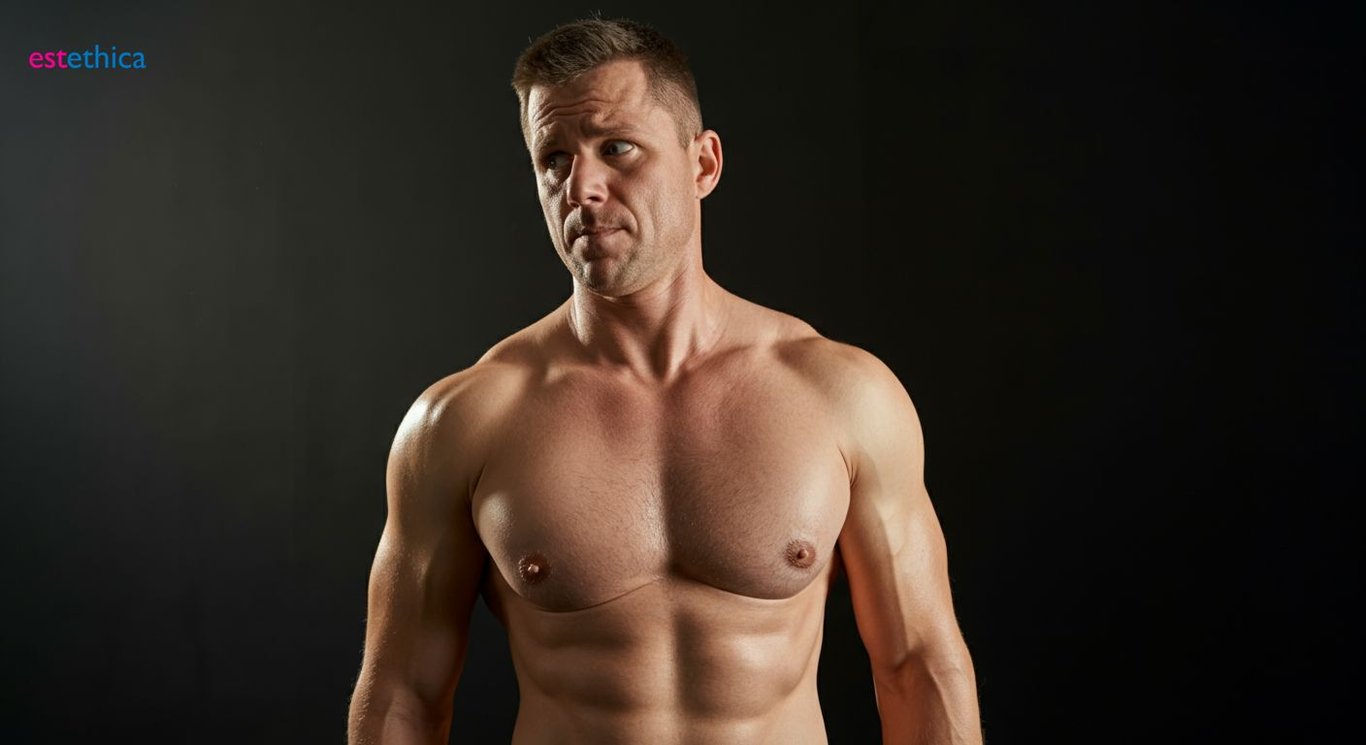Gynecomastia: Beyond Enlarged Breasts, Find Real Solutions
Address gynecomastia effectively: explore solutions beyond mere enlargement and experience transformative results.
Gynecomastia, characterized by enlarged male breasts, is a condition that affects confidence and physical appearance. Understanding its causes and exploring both surgical and non-surgical treatment options is crucial for those impacted by this condition.
Decoding Gynecomastia: What Causes Enlarged Male Breasts?
The Hormonal Connection to Gynecomastia
Gynecomastia, characterized by the enlargement of breast tissue in men, is often rooted in hormonal imbalances. Specifically, an imbalance between estrogen and testosterone can stimulate breast tissue growth. While testosterone is predominantly a male hormone, men also produce small amounts of estrogen. When estrogen levels increase relative to testosterone, it can trigger the development of gynecomastia. This imbalance can occur naturally during puberty, as well as in older men as testosterone production declines. In fact, it is estimated that up to 60% of boys experience some degree of gynecomastia during puberty due to fluctuating hormone levels.
Moreover, certain medications can disrupt hormonal balance, leading to gynecomastia. For example, some anti-androgen drugs used to treat prostate cancer can interfere with testosterone production, indirectly raising estrogen levels, or gynecomastia spironolactone, prescribed as a diuretic, may have similar effects. Understanding the role of hormones in gynecomastia spironolactone is crucial for identifying effective treatment strategies.
Contributing Factors to Gynecomastia
- Medications: Certain drugs, such as anabolic steroids and anti-anxiety medications, can list hormonal balance.
- Health Conditions: Conditions like hyperthyroidism and kidney failure can impact the hormonal system, leading to enlarged male breasts.
- Lifestyle Factors: Excessive alcohol consumption and obesity can influence hormone levels and increase the risk of gynecomastia.
Exploring these underlying causes enables a more tailored approach to managing enlarged male breasts. Identifying whether a hormonal imbalance, medication side effect, or underlying health condition is responsible can guide treatment options, be they medical interventions or lifestyle adjustments, making it easier to address and improve the condition of gynecomastia.
Gyenemastia Cost
In evaluating options for gynecomastia treatment, it's essential to consider various factors that influence the overall cost. This includes not only the direct surgical expenses but also pre-operative evaluations, anesthesia fees, and post-operative care.
Diagnostic Steps for Identifying the Causes of Gynecomastia
- Medical History Review: A thorough examination of the patient’s medical history, including medication use, helps pinpoint potential contributors.
- Physical Examination: A comprehensive physical exam to assess the characteristics of breast enlargement and rule out other conditions.
- Hormonal Blood Tests: Analyzing hormone levels, such as testosterone and estrogen, can reveal imbalances contributing to gynecomastia.
These diagnostic steps are essential for determining the possible factors of gynecomastia spironolactone. Determining what is the main root cause, will guide treatment decisions, in order to ensure a faster recovery.

Gynecomastia Surgery: Reshape Your Chest and Restore Confidence
Understanding the Gynecomastia Surgery Procedure
Gynecomastia surgery, a solution for enlarged male breasts, primarily involves the surgical removal of excess glandular and fatty tissue. There are several techniques for this, including liposuction, excision, or a combination of both. Liposuction is often preferred for cases where excess fat is the main issue. Excision is used when there's a need to remove glandular tissue or excess skin. Many patients see tangible results, leading to improved chest contour and body image. Around 85% of patients who undergo gynecomastia surgery report satisfaction with their results, noting enhanced physical appearance and self-esteem.
Additionally, the recovery phase is essential. Directly following the procedure, patients will experience some degree of swelling and bruising. Compression garments are typically worn to help reduce swelling and support the healing tissues. While individual experiences vary, most patients can return to light activities within a week. This approach aims for a more masculine chest, addressing both physical and emotional well-being.
Who Benefits Most from Gynecomastia Surgery?
- Adult Men with Stable Gynecomastia: Ideal candidates are men whose breast enlargement has stabilized and is not due to ongoing hormonal changes or medication.
- Individuals in Good Physical Health: Optimal candidates should be free from medical conditions that could increase surgical risks or impair healing.
- Non-Smokers: Smoking can impede the healing process, making non-smokers better candidates for surgery.
Essential Considerations Before opting for Gynecomastia Surgery
- Realistic Expectations: Understanding what surgery can achieve is crucial. Ideal candidates have realistic expectations about the outcomes.
- Commitment to Recovery: Patients need to adhere to post-operative care instructions, including wearing compression garments and limiting activities.
- Awareness of Potential Risks: Being informed about potential complications, such as scarring or changes in nipple sensation, is important.

Beyond the Scalpel: Exploring Non-Surgical Gynecomastia Treatments
Hormonal Therapies as a Non-Invasive Option
Hormonal therapy presents a non-surgical approach to managing gynecomastia, particularly when hormonal imbalances are the root cause. Medications like selective estrogen receptor modulators (SERMs), such as tamoxifen, may be prescribed to block the effects of estrogen on breast tissue. These treatments aim to restore hormonal equilibrium and reduce breast size. For example, hormonal therapy might be considered for gynecomastia that develops during puberty or as a result of certain medical conditions affecting hormone production. It's often favored for its less invasive nature, though its effectiveness can vary depending on the individual and the specific cause of their gynecomastia. Individuals may also consider gynecomastia spironolactone as a treatment option, which is administered if hormonal causes are prominent.
These therapies are designed to address the underlying imbalances that lead to enlarged male breasts, offering a potential alternative to surgery. This approach is especially beneficial for adolescents experiencing temporary hormonal fluctuations or for adults whose gynecomastia is linked to specific medications or health issues.
Lifestyle Adjustments for Managing Gynecomastia
- Weight Management: Reducing excess body fat can lower estrogen levels, potentially decreasing breast size.
- Dietary Changes: Avoiding alcohol and certain medications known to exacerbate gynecomastia is recommended.
- Exercise Regimen: Regular physical activity can help balance hormone levels and reduce overall body fat.
Lifestyle adjustments are a foundational aspect of managing gynecomastia without surgery. By focusing on weight management, dietary changes, and consistent exercise, individuals can influence their hormonal balance and potentially alleviate the condition.
Understanding Non-Surgical Treatment Expectations
- Realistic Outcomes: Non-surgical methods may be more effective for mild to moderate cases of gynecomastia.
- Time Commitment: These treatments often require consistent effort and patience, with results appearing gradually over time.
- Professional Guidance: Consulting with a healthcare provider is essential to determine suitability and monitor progress.

Gynecomastia: Before & After Photos – See Real Transformations
Visual Impact of Gynecomastia Treatment
Evaluating before and after photos provides potential patients with a concrete understanding of the changes achievable through gynecomastia treatment. These visuals often highlight significant improvements in chest contour and overall body aesthetics, offering a clear representation of what can be accomplished. Such images are particularly crucial for those unsure about the procedure, as they transform abstract possibilities into tangible expectations. Visual evidence can illustrate the degree of correction possible, from subtle refinements to more dramatic transformations, thereby assisting individuals in making informed decisions about pursuing treatment for enlarged male breasts. The use of these images is important because it helps to bridge the gap between uncertainty and confidence, showing real outcomes that boost patient assurance.
Furthermore, examining before and after photos can help individuals align their expectations with realistic results. These visuals showcase the diverse range of body types and conditions that surgeons address, emphasizing that outcomes are tailored to each patient's unique anatomy. Seeing these real-life examples allows prospective patients to visualize potential changes in their own bodies. With the power to illustrate potential refinements, these images can assist in making informed decisions and promote positive expectations regarding treatment outcomes. Using these visual tools increases transparency and trust, allowing individuals to approach surgery with well-informed optimism.
Reinforcing Confidence Through Visual Results
- Demonstration of Aesthetic Improvement: Before and after photos clearly showcase the potential for significant aesthetic enhancement.
- Evidence of Psychological Benefits: Visual transformations can boost self-esteem and reduce the emotional impact of gynecomastia.
- Clear Expectations: These images provide a realistic view of the potential outcomes, helping patients to align their hopes with achievable results.
Viewing tangible results fosters a deeper sense of trust and motivation among potential patients. It reinforces the idea that gynecomastia surgery can deliver meaningful improvements. The transformation extends beyond physical alterations; it supports emotional well-being, increasing both self-esteem and satisfaction. Reviewing visual results serves as a powerful motivator, transforming fears into positive expectations.
- Initial Consultation: Surgeons often use before-and-after photos to facilitate discussions about individual goals and expected outcomes.
- Personalized Planning: Analysis of these visuals enables the tailoring of treatment plans to suit the particular body types and conditions of each patient.
- Informed Consent: Presenting potential results contributes to fully informed consent, allowing individuals to confidently choose their treatment path.
By reviewing these visual examples, aesthetic surgeons can enhance the dialogue with their patients. They help set the stage for personalized treatment plans that take into consideration the unique goals and physical traits of each individual. This personalized approach can ensure that these individuals are satisfied with their plans. By fostering comprehensive understanding and realistic expectations, doctors ensure each patient feels prepared both before and after gynecomastia surgery.
Advanced Gynecomastia Treatment via Liposuction and Excision for Enhanced Chest Contouring
Personalized Treatment Plans Utilizing Advanced Diagnostic Steps for Gynecomastia Correction
Frequently Asked Questions
What are the primary causes of gynecomastia?
Who is an ideal candidate for gynecomastia surgery?
What non-surgical treatments are available for gynecomastia?
How do before and after photos help in understanding gynecomastia treatment?
Achieve your aesthetic goals with estethica's expert team and advanced techniques.
📞 Schedule Your Free Consultation!